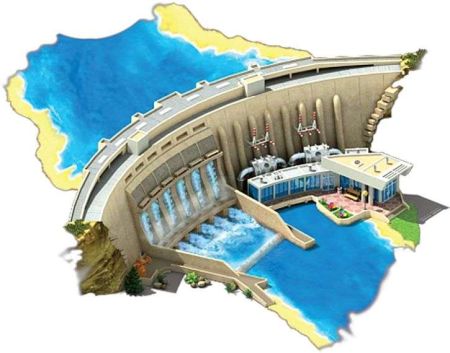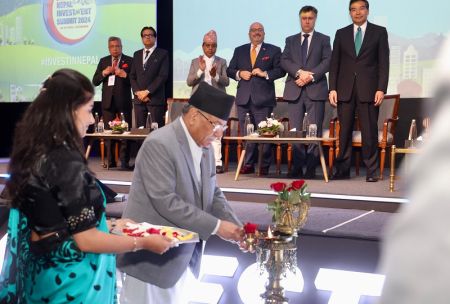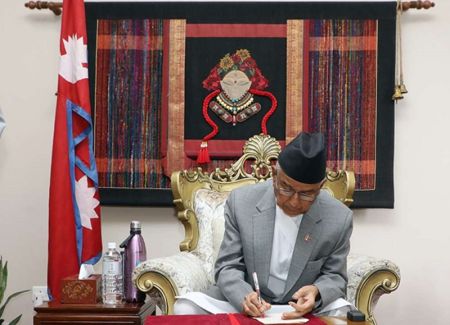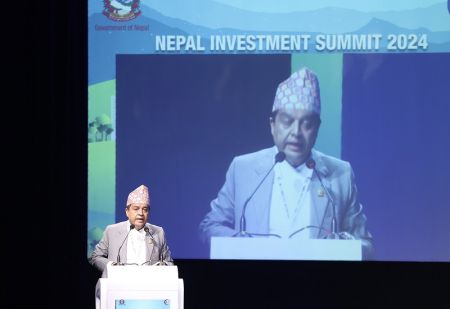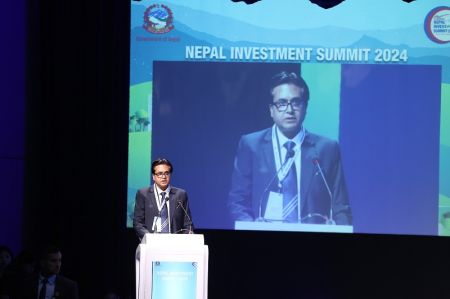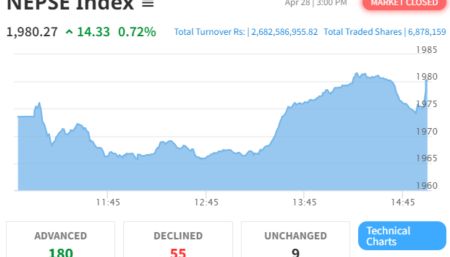Bijay Rajbhandary
Chairman and Managing Director
CE Construction Pvt Ltd
Housing culture has been in practice for almost a decade now. It is certainly getting popular as it provides infrastructure facilities like security, drinking water, electricity, internet, common space and other facilities. However, despite the growing trend of community housing, we can't expect the individuals to completely stop building independent residences.
You have been in the housing industry for some time now. Where do you stand currently?
Real Estate is our core strength but at the same time, we have been operating in other sectors as well. We have a wide range of properties in different locations in and outside of Kathmandu and our ultimate objective in the real estate is to serve the mass. Currently, the housing sector is experiencing a slow growth. Different stakeholders such as the government, regulatory body, financial institutions, developers, investors and individual buyers are somehow responsible for the slow pace of the housing industry.
The NRB has relaxed lending for the housing sector recently. How big is the relief?
It has definitely provided relief to some extent. But the impact is yet to be seen because there is a liquidity crunch in the market and the banks have a problem maintaining credit-to-deposit ratio. We need to work very hard to regain a prosperous real estate climate.
As the banks are shying away from investing further in this sector, how do you plan to take your projects forward?
We have been using different financial tools on a project-to-project basis and the major portion of our cash flow is coming through sales. There are basically two categories of buyers the speculative investors who intend to sell the property at later date at higher prices and the end users who really want to settle in those homes. Both types of people seem quite reluctant to invest in this sector at the moment because of political uncertainty and unclear policies. We are working hard to come up with innovative tools to cater to both the categories. At the same time, we are introducing attractive packages for the buyers. Project management being our strength, we periodically map our project execution plan, assess the risks and the uncertainties and act accordingly. Even though the banks are going through a difficult time, they have been extending cooperation towards us because of our credibility.
The interest rate has tremendously increased increasing the cost of housing development and eventually the price. Thus the properties are now beyond the general public's affordability. What do you suggest to tackle this problem?
Yes, the housing sector is reeling from the impact of the interest hike, however, it is minimal. The projects are usually funded through equity, borrowings from the financial institutions, credit from the vendors and subcontractors and most importantly, from sales. In general, the share of bank funding in a project is about 30 to 45 per cent of the base cost. Of the sales price, the share of bank funding is only 25 to 35 percent. So, the interest hike of 5 per cent has an impact of about 1.25 to 1.75 per cent on the sales price. The developers should be willing to absorb that from his profit in view of this difficult time. Therefore, the slaes price need not go up just because the interest rate has gone up. In order to continue with the planned projects, the developers will have to resist hiking the price and be content with lower profit. This is the best strategy till the buyers are in wait and watch mentalality. The impact on sales is not because of the price of the product itself but due to the interest on loan which buyers take from the financial institutions.
Don't you think that the houses and apartments are priced unnaturally high?
When we talk about the price of the housing products, one needs to take into account the basic components: the price of the land as well as the cost of the building and infrastructure. So, in the current context, developers can only play with the land price as the other two components are easy to calculate. We ask the buyers compute the price of the above mentioned components of our units and let them sum it up. As far as the land price is concerned, buyers can check the price in the project neighbourhood. Our price turns out to be 20 to 25 per cent less than what the buyers come up with after such calculation.
Since the buyers are getting the finished product, they save in the hassles that they may otherwise go through when they build their house on their own. If you assign monetary value also to these hassles, the houses that you buy from a developer are much cheaper than what you will have if you construct it on your own. In our case, it is even cheaper because we are the single real estate solution provider- we buy the land ourselves which saves in the service fee of the broker, we do in-house designing, we ourselves are the contractors and we buy local material in bulk and import many branded materials through our trading division. In comparison, individual house owners building their own house have to buy all these on their own in retail. In that process they end up paying higher for everything. And quality is the further value addition when you buy from a developer because the developers are equipped with resources like manpower, equipments and construction technology.
It is said that apartments are not much preferred by Nepali people. Therefore, a lot of apartment units from the developers are lying unoccupied. How do you view this?
This is very true but at the same time, we do need to understand that any change takes time. Currently, a number of units of completed apartments are either still unsold or unoccupied even if they are sold. Therefore, progress of many projects is slowed. However, this slowdown in the progress is not only due to inadequate sales but also due to lack of fund as bank lending is curtailed. Many developers fear that if they borrow at high cost and finish the units but they remain unsold for long, they may have to incur very high maintenance cost for such apartments.
However, we in CE are trying to complete all our projects on time to send a positive message across. Presently, the criteria for the buyers selection of a property are: the credibility of the developers and the physical status of the project. Buyers are comfortable in buying finished products because it is like buying any other commodity. Counselling as well as other marketing tools might not be that effective at the moment as compared to putting on sale the finished product.
No matter how the people at present may view the apartments, the apartment projects are viable because the price that the buyers of such apartments will be paying will be lot cheaper when compared to the upgraded lifestyle that the buyer can enjoy in such apartments. It is just a matter of time before people shed their inhibitions about buying apartments.
What are the required measures to improve this sector?
First of all, the country needs to assess whether real estate is a need for us or not. If yes, all the concerned parties including the developers need to extend their full cooperation. To gain the confidence of the buyers, I have different recommendations to my colleagues. Those who have not started their projects must have a thorough plan to work out the cash flow before they start the project. They must also have a full proof marketing plan. As for those who have started their projects, their primary responsibility should be to complete the sold units fast and meet the contract conditions as well as reschedule construction of unsold component of the project based on cash flow and sales forecast. This strategy will not only help win the confidence of the buyers and investors but also that of the financial institutions.
The average age of a building is around 50 years. What will happen to those living in the apartments and individual houses developed by housing developers after this time period?
The age of a building depends on the technology used to build it. The property is insured against earthquake, fire or any other kind of damage. If something happens during the lifetime of a building, either a community housing or an apartment building, it will usually be compensated through insurance. Once the building's lifetime expires, the law clearly states that the ownership of the property will be ascertained on a pro-rata basis. You have two options - either to rebuild the property with the same proportion of ownership or if all the flat owners of a particular property agree to sell it, they will get the sales proceeds divided amon themselves on a pro-rata basis. If the property value grows tremendously during the lifetime of the building or afterwards, the owners will have the option to demolish and come up with a different product. For example, it can be a commercial complex or any other product that may yield higher return.
Is there an issue with the ownership of the flats?
Well, there is no issue whatsoever at all regarding flat ownership. Once you buy a flat, you get an ownership certificate from the Land Revenue Office. When a building is complete, the municipality and the department of urban development and physical planning inspect it and issue the completion certificate. It then recommends the Land Revenue Office which issues you the certificate of ownership.
How long will it take to change the housing culture from independent houses to community living in flats and condominiums ?
Housing culture has been in practice for almost a decade now. It is certainly getting popular as it provides infrastructure facilities like security, drinking water, electricity, internet, common space and other facilities. However, despite the growing trend of community housing, we cant expect the individuals completely stopping to build independent residences on their own. This is because housing projects will not be able to meet the individual requirements of all the people.
Tell us something about your ongoing projects?
CE's current housing projects include: Vinayak Colony (176 units of independent houses) in Bhaisepati, Grande Towers (529 High-End apartments) in Dhapasi, Veena's Residency (76 units independent houses) and Harmony Housing (74 units independent houses). Similarly, we have recently completed Vinayank Colony-phase 1 in Bhaisepati, Rio Apartment in Kupondol and The Retreat Apartment in Bijayshwori. We are also coming up with two affordable independent housing projects in Sitapaila and Budhanilkatha.







